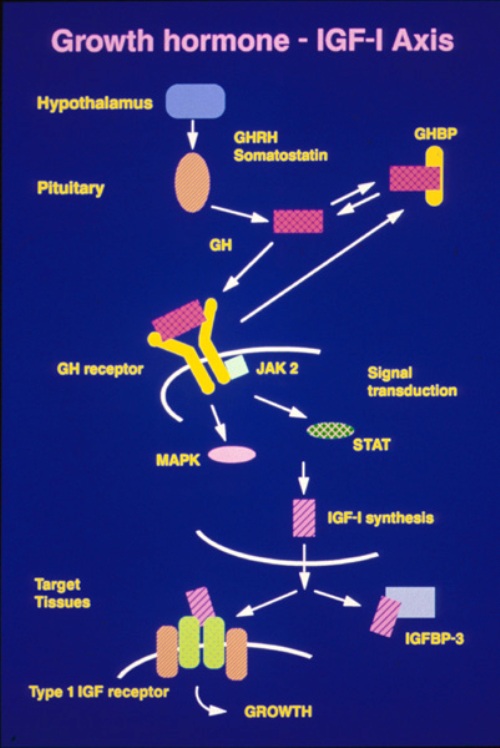

The IGF-1 (Insulin Growth Factor 1) is a hormone synthesized primarily in the liver but also by bone cells and muscle cells. The stimulus for the production of IGF-1 is caused by the growth hormone (GH) and can be minimized by malnutrition, reduced sensitivity to GH and lack of GH receptors and have similar molecular structure to insulin (LIMA and FUMAGALLI, 2012) .
Hall and Sara (1990) and Rosenfeld et al. (1990) follow the same concept and highlight the existence of 62 amino acids counterparts.
This protein has the primary mediator of the effects of growth hormone. The GH has its production in the pituitary gland and is released into the bloodstream, where it stimulates the liver to produce IGF-1.
IGF-1 stimulates growth in almost all body cells, especially in muscle cells, cartilage, bone, kidney, liver and lung and regulates the growth and development of nerve cells (LIMA and FUMAGALLI 2012).
IGF-1 is a hormone still under study, in which the long thought to be only an enhancer of the growth processes of tissues, but studies have reported the ability to potentiate cancer (particularly colon and prostate cancer). As positive spots appear improvement in cell division and cell recovery of brain, heart and muscle. There are reports that low levels of IGF-1 can lead to increased chance of heart attack. Also sought as a way of supplementation to optimize athletic performance and muscle mass gain, there are findings that supplementation with this hormone leads to the sports apex faster, but also aging (LIMA and FUMAGALLI, 2012).
We can consume IGF-1 by means of milk, meat and soy derivatives. Maintain normal levels of this hormone do not seem to lead to losses and beneficial.
Image reference: BLOGIMG